Sign up for our free daily newsletter
YOUR PRIVACY - PLEASE READ CAREFULLY DATA PROTECTION STATEMENT
Below we explain how we will communicate with you. We set out how we use your data in our Privacy Policy.
Global City Media, and its associated brands will use the lawful basis of legitimate interests to use
the
contact details you have supplied to contact you regarding our publications, events, training,
reader
research, and other relevant information. We will always give you the option to opt out of our
marketing.
By clicking submit, you confirm that you understand and accept the Terms & Conditions and Privacy Policy
Wealthy individuals and businesses linked to the Russian regime have been further restricted from accessing UK legal expertise under new sanctions introduced by the UK government.
The sanctions, which were unveiled last week (29 June), target Russian businesses accessing UK legal expertise for certain types of commercial deals deemed to benefit the Russian economy.
The Russia (Sanctions) (EU Exit) (Amendment) (No. 3) Regulations 2023 prevents UK lawyers from advising Russian companies seeking advice on finance or trade thereby benefiting from City legal expertise in global financial markets.
Before the war in Ukraine started the UK exported £56m in legal services to Russian businesses annually. However, Russia’s invasion triggered the mass exodus of international law firms from Moscow along with pledges they would wind down their Russia-related work.
The Lord Chancellor, Alex Chalk KC, said: “The UK legal system underpins many international contracts and businesses, and we will no longer allow Russia to benefit from our knowledge and expertise.”
He added: “The Russian regime must be held to account for its violation of international law, and these sanctions are increasing the economic pressure to further isolate the Russian government from the rest of the world.”
The government confirmed, however, that sanctions would not apply to Russians seeking legal representation, arguing that access to legal support was essential to the rule of law.
The new sanctions have been endorsed by professional legal bodies, although they underlined the need for individuals to have legal representation in the courts.
The City of London Law Society said: “There is a need for strong action to be taken which supports the UK government’s response to Russian actions, while at the same time ensuring that the rule of law, including the all-important access to justice, is upheld.
“We will help to ensure these latest sanctions are properly enforced while continuing to ensure they do not cause any inappropriate or inadvertent restrictions on these fundamental rights.”
Those sentiments were echoed by Law Society of England and Wales president Lubna Shuja and Bar Council chair Nick Vineall KC, who during his term has strongly defended the cab-rank rule, which requires suitably qualified barristers to take on cases when they are available.
“It is important for the rule of law that no one is excluded from representation when contentious legal issues come before the English courts for decision,” he said.
A High Court ruling in January by Mrs Justice Cockerill found that UK sanctions would not preclude the entry of judgments in favour of Russian-sanctioned parties and offered valuable guidance on the law of sanctions, with particular implications for litigation involving sanctioned entities.
This week the Court of Appeal is hearing an appeal in the Bank Okritie litigation, under which oligarch Boris Mints and his sons are defending an action by National Bank Trust, which is 99% owned by the Central Bank of Russia.
City lawyers speaking to this title said the appeal was the latest legal test to the UK’s sanctions regime, with implications for other cases as to what constitutes “ownership” or “control” for the purposes of UK sanctions regulations.
Research by Portland, published in May, found that Russian claims have reached a record high in London’s commercial courts. Some 38 Russian individuals and 19 companies featured in the 257 judgments handed down in the Business and Property Courts from April 2022 to March 2023.
Email your news and story ideas to: [email protected]











